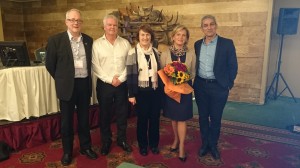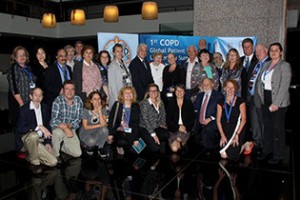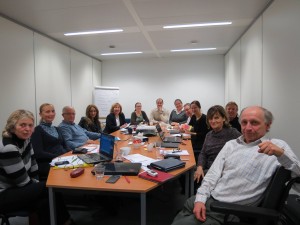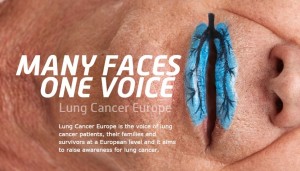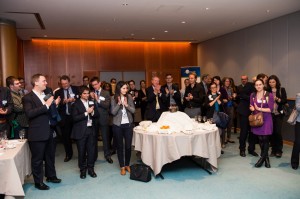Meetings with the European Medicines Agency
On the 25th November, the European Medicines Agency (EMA) organised a training session for patients and consumers involved in EMA activities. EFA was represented by Junior EU Policy Officer Jelena Malinina and EFA Member and President of the Association of Parents of Asthmatic Children of Zagreb Silvio Šanko. The training provided a comprehensive overview of the EMA activities, patients’ involvement opportunities in the relevant committees meetings, review of medicines package leaflets, safety communications and other documents related to medicines. Furthermore, EMA representatives explained the necessity and impact of pharmacovigilance - science relating to the collection, detection, assessment, monitoring, and prevention of adverse effects of pharmaceutical products. In addition, practical aspects of engagement with EMA were demonstrated to the participants of the training. On the 26th November, European Patients’ Forum (EPF) Vice-President and EFA Director Susanna Palkonen, EFA Member and the President of Lithuanian Council of Asthma Clubs Lina Bužermanienė and EFA Junior EU Policy Officer Jelena Malinina took part in the EMA Human Scientific Committees’ Working Party with Patients’ and Consumers’ Organisations (PCWP) meeting. During the meeting, the EMA representatives presented an overview of activities in 2014 and revealed the upcoming plans as well as developments in EMA’s communication strategy. Moreover, PCWP committees’ representatives introduced the feedback of their work and activities, as well as presented updates on the projects on vaccines (ADVANCE). The meeting minutes will shortly be published at the EMA website.
EFA Patients at EAACI-ISAF
|
From left to right, EAACI Leif Bjermer, EFA Board Member Per-Ake Wecksell, EFA President Breda Flood, EAACI Mina Gaga and EAACI Nikos Papadopoulos. |
The second International Severe Asthma Forum (ISAF) took place in Athens from 13th to 15th November and counted with the participation of EFA President Breda Flood, EFA Board Member Per-Ake Wecksell and EFA Communications Officer Isabel Proaño. The meeting served to gather allergist specialist from Europe to present new evidence on asthma development, diagnosis and treatment as well as to discuss the remaining challenges ahead. [caption id="attachment_6341" align="alignright" width="300"][/caption] Especially, two new studies on the treatment and identification of severe asthma were presented. On the first one, Dutch researchers studied a phenomena of some children having uncontrolled asthma despite using inhalers and found out that this group of patients can be identified by using a so-called breathprint – a novel device that takes a fingerprint of the inflammatory profile in the exhaling patient. This finding could be crucial to identify different asthma types in a non-invasive way, thus significantly contributing of asthma management. The second one refers to an observational trial in Germany showed that purifying the air in the breathing zone at night using a temperature-controlled laminar airflow (TLA) device, in addition to patients’ regular medication, significantly reduces the risk of exacerbation. Allergen-purified zone at night reduces the number of allergens inhaled and that has an impact for the upcoming day, and in the long run – reduces disease activity.
First COPD ‘Global Patient Leadership’ Summit
EFA Board Member Isabel Saraiva from EFA’s Portuguese member association RESPIRA participated at the 1st COPD Global Patient Leadership Summit, organised by the COPD Foundation in Madrid from the 5th-7th of November 2014 with the aim of creating a worldwide framework of capacity-building. Ms. Saraiva presented the data that was collected from 19 European countries and that was published under “Minimum standards for COPD patients in Europe”, which focuses on healthcare and other policies related to five different areas of care for COPD patients: 1) Prevention, 2) Early diagnosis, 3) Management and Therapy, 4) Rehabilitation and 5) Alpha-1 Patient Care. The publications provides an overview of the 8 different standards EFA requested to be “minimum standards of care” for COPD patients in Europe and the future steps that lie ahead within the framework of this Project. Please find for your information EFA’s book on minimum standards of care for COPD patients in English, German, French, or Spanish on EFA's Website.
Pharmacovigilance, Drug Safety and Risk Management Conference
EFA’s Susanna Palkonen spoke on November 27th to industry experts at a training event in Brussels to conform and make the best out of the EU pharmacovigilance legislation. Her intervention was about the benefits of a strong collaboration in this field with patient groups in order to ultimately develop medicines based on needs and find the right balances between their benefits and risks. There is also a specific guidance coming up from the EMA later this year on ‘public involvement in pharmacovigilance’ (the so-called Module XI), which we as patients are looking forward to. The feedback was very positive among the more technical content at the conference. The presentation is available here.
ENSP General Assembly
On the 17th of November, EFA EU Policy Advisor Roberta Savli participated in the General Assembly of the European Network for Smoking and Tobacco Prevention (ENSP). Among other policy priorities, EFA-ENSP guide to implement the European regulation on e‐cigarettes was presented and discussed. These guidelines aim at helping Member States to transpose and implement article 20 of the Tobacco Products Directive that applies to electronic cigarettes. We call on national authorities to go beyond what required by this legislation, namely by regulating both electronic cigarettes with and without nicotine, by applying a general advertising ban, by banning electronic cigarettes in all public places where smoking is not allowed, by strictly regulating flavours, by prohibiting the sale of e-cigarettes to minors, and by applying the same requirements regarding taxation and illicit trade as per cigarettes.
European Patient's Forum Patient Empowerment Working Group
On November 24th EFA Communications Officer Isabel Proaño participated in the first meeting of the European Patients's Forum (EPF) Empowerment Working group. Composed of several EPF members well representing European scope and diseases, the group will gather together to lead on patient empowerment initiatives.
Lung Cancer event at European Parliament
On the 18th November, Lung Cancer Europe (LuCE) organised an event “Many Faces One Voice” to provide recommendations from patients and experts on lung cancer misperception. The event was hosted by the Member of the European Parliament (MEP) Peter Liese (EPP, Germany). EFA was represented by the Junior EU Policy Officer Jelena Malinina. Lung cancer is the most frequent cause of death from cancer, with 353,000 deaths every year and it incurs the highest economic cost out of all cancers in the European Union. Furthermore, the lung cancer is one of the hardest of all cancers to diagnose and one of the most difficult to treat, therefore it tends to have a poor survival rate: in Europe, only 11.2% males and 13.9% females survive from the lung cancer. In most cases, lung cancer is only diagnosed once it has reached an advanced stage and 80% of patients with lung cancer die within one year of diagnosis. Shockingly, a patient diagnosed with lung cancer today has the same likehood of dying as it was 40 years ago. Moreover, there is a growing number of lung cancer cases among non-smokers. What can be done to improve lung cancer management? (1) Better disease prevention through tobacco control policies; (2) Developing EU guidance to set up quality assured early detection programmes for lung cancer; (3) Funding of innovative and life-changing treatments for lung cancer patients; LuCE highlighted that it will actively work towards achievement of the stated means to reduce the mortality of lung cancer, to promote best possible and equal treatment for patients, as well as to reduce the stigma associated with lung cancer.
Scientific Advisory Board (SAB) of the ERA-NET “ERACoSysMed - Systems Medicine
EFA’s Susanna Palkonen alongside with David Supple from the U-BIOPRED project Patient Input Platform were invited as patients and patient representatives to attend the first meeting of the Scientific Advisory Board of the ERA-NET partnership on systems medicine in Berlin on the 7th. The meeting looked at the first call text to be launched in early 2015 and they had the opportunity to contribute in the scientist’s discussion on a confidential basis from patient perspective.
European Voice’s Health Check Annual Forum
On the 4th of November, the European Voice organised its fifth EV Health Check Annual Forum on the future of the EU healthcare 2014-2019. This year has been crucial for European politics due to the European Parliament elections and the appointment of a new Commission. Key policy makers, international business leaders, industry specialists and representatives of the civil society discussed the challenges and defies that the EU will have to face in the next 5 years to shape the future of healthcare in Europe. EFA was represented by EU Policy Advisor Roberta Savli. It was underlined that 70% of healthcare spending was dedicated to chronic diseases in Europe so Europe should capitalise the scientific knowledge already existing and build on this to develop strong and effective policies to improve the health of citizens and reduce inequalities within and between Member States. Patients’ participation in policy developments and the proper implementation of the “health in all policies” principle were discussed as crucial issues to tackle.
10th Anniversary of Health First Europe
On the 12th November, Health First Europe organised a reception at the European Parliament to celebrate its 10th anniversary and the launch of a new interest group at the European Parliament to facilitate greater focus on improving patient access to innovation in health and social care. Together with Members of the European Parliament Marian Harkin (ALDE, Ireland), Karin Kadenbach (S&D, Austria) and Dr. Kay Swinburne (ECR, UK), the Interest Group will address key policy objectives around research, health promotion and public health at EU level such as: innovation on the EU health and social care agenda, raising awareness of patient-centric solutions for sustainable, accessible and resilient health systems, and seeking broad support from MEPs for implementing innovative solutions for patients and healthcare professionals. The first meeting of the Interest Group will take place in 2015.
Medicines Shortages in European Hospitals
On the 17th November, the European Association of Hospital Pharmacists (EAHP) organised an event to present the results of the largest pan-European survey on medicines supply shortages in the hospital sector, its prevalence, nature and impacts for patient care. 600 hospital pharmacists in 36 European countries took part in the survey, and the report based on the survey results revealed that over 86% of hospital pharmacists are experiencing difficulties in sourcing medicines with 66% reporting this is a daily or weekly problem. What is more, 75% of the surveyed hospital pharmacists agreed that medicines shortages in hospital are having a negative impact on patient care. Consequences for patients included delayed or interrupted treatment, unnecessary experience of side effects and deterioration in patients’ conditions. In addition, the hospital pharmacists reported the enormous costs in time diverted to sourcing alternative supplies, as well as an increased stress and confusion. Taking into account the presented statistics, EAHP calls the EU for the following steps:
- Improved collection of information about medicines shortages in Europe ;
- Clarification and enforcement of legal responsibilities for suppliers to report likely disruptions and problems at an early stages;
- Responsibility to be taken by the European Commission to tackle medicines shortages as a cross border health threat;
- Criteria for a fair distribution in case of shortages based on patient’s needs but never on commercial interests.
A video of the event is available here.
